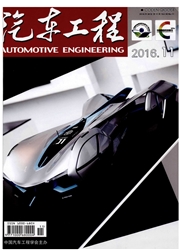

 中文摘要:
中文摘要:
基于插电式混合动力汽车(PHEV)可以通过外网充电的特性,选取发动机消耗燃油的成本与电机消耗电能的成本之和作为优化目标函数,采用庞特里亚金极小值原理进行优化仿真;研究了PHEV不同工作模式(电量消耗-电量维持模式和混合模式)对能耗经济性的影响;分析了行驶里程、电池荷电状态(SOC)初始值和能量价格比对能量分配控制策略的影响;最终制定了实时优化控制策略并与门限值控制策略进行对比仿真,结果表明,与门限值控制策略相比,采用制定的实时优化控制策略能耗经济性在不同的SOC初始值下都有大幅度的提高。
 英文摘要:
英文摘要:
Based on the features of plug-in hybrid electric vehicles(PHEV) that it can be charged from power grid,the sum of the cost of fuel consumed in engine and the cost of electricity consumed by motor is taken as optimization objective function,and an optimization simulation is conducted by using Pontryagin's minimum principle.The effects of different working modes(charge-depleting / charge-sustaining mode and compound mode) of PHEV on its energy consumption economy are studied,and the influences of driving mileage,initial SOC of battery and energy price ratio on energy distribution control strategy are analyzed.Finally a real-time optimization control strategy is formulated,and a comparative simulation is performed with threshold control strategy as counterpart.The results indicate that compared with threshold control strategy,the energy consumption economy of PHEV with realtime optimization control strategy has substantial improvement under different initial SOCs.
 同期刊论文项目
同期刊论文项目
 同项目期刊论文
同项目期刊论文
 期刊信息
期刊信息
